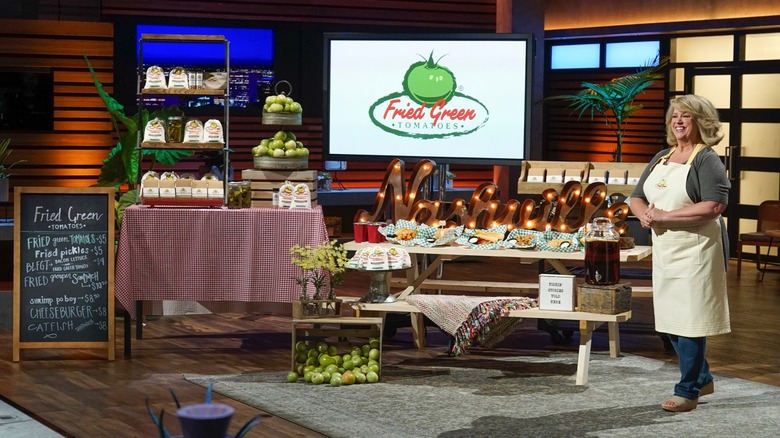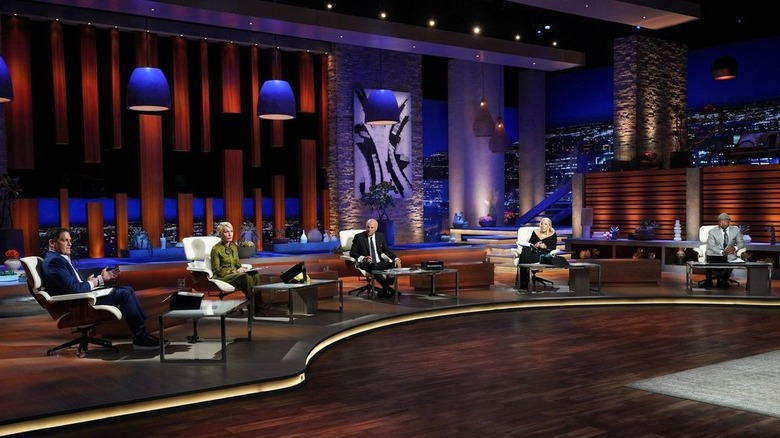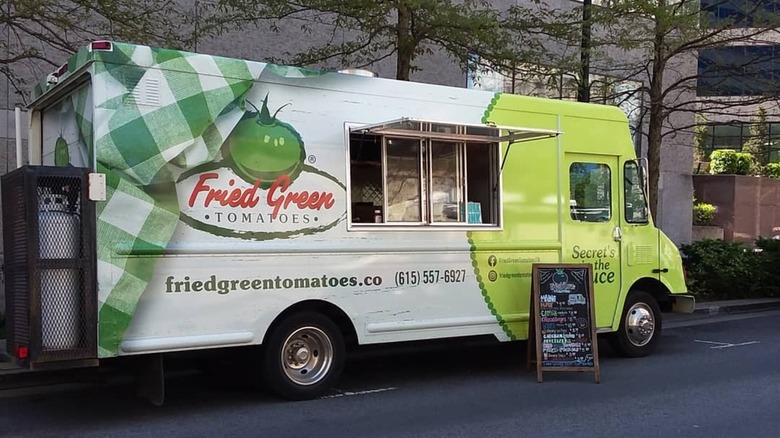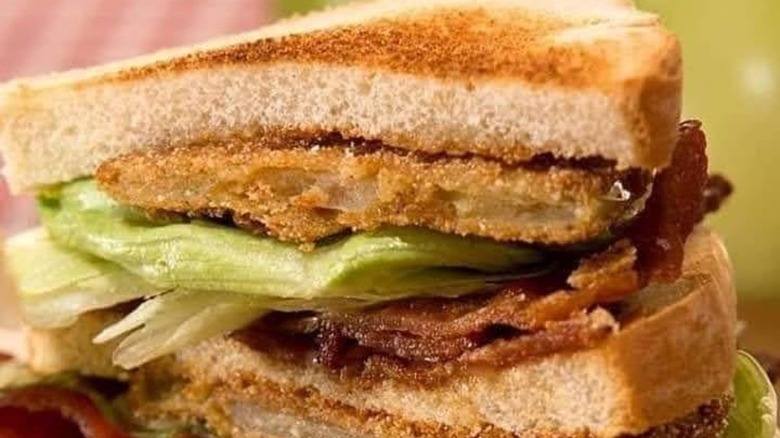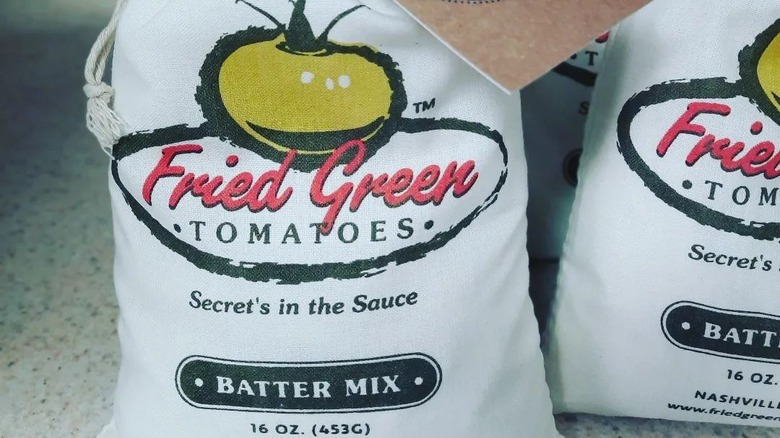Fried Green Tomatoes: Here's What Happened After Shark Tank
Holly Cooper shared her unique brand of Southern hospitality on "Shark Tank" during the 11th season of the long-running ABC television show. The Nashville, Tennessee-based entrepreneur was seeking $200,000 for a 15% stake in her restaurant and retail business, Fried Green Tomatoes. Billionaire shark Mark Cuban was visibly chomping his teeth as Cooper ran through her menu, which included the company's famous fried green tomato sandwich, as well as Southern specialties like a grouper sandwich, fried pickles, and a shrimp po' boy. The sharks got samples, of course, and had rave reviews. Kevin O'Leary, a regular on the shark panel, said, "The food is fantastic."
In addition to her food truck, which she primarily uses for special events, Cooper noted that she had been retailing a Fried Green Tomatoes Batter Mix since 2016 and had placed the product in 600 stores across 42 states. The batter mix sells for $8.99 against a cost of $1.28 per package, numbers the sharks were very much interested in, along with yearly sales figures. The latter was $268,000 for the food truck and retail business combined in the year leading up to Cooper's appearance on the show in May 2020.
Cooper, a former café owner and commercial salesperson, claimed her ultimate goal was to franchise the food trucks.
What happened to Fried Green Tomatoes on Shark Tank
O'Leary may have loved the food, but he was skeptical of the valuation Cooper placed on the business, noting that her asking price indicated a total valuation of $1.3 million. He thought that was high and decided to pass. Cuban, another admirer of her food, also passed after pointing out that the business essentially consisted of Cooper and her daughter. He felt the business wasn't investable without growth and more employees.
The other three sharks on this episode — Lori Greiner, Daymond John, and Barbara Corcoran — had mixed opinions. Greiner passed, explaining that she preferred lighter and healthier foods. John passed as well, although he would soon reenter the bidding after seeing Corcoran's enthusiasm for the pitch. "I can make you rich within two years, no doubt in my mind," she told Cooper, throwing in words like "empire" and "gold mine." The catch, of course, was that she wanted to be amply repaid for her involvement and for the invaluable help she was confident she could provide. Corcoran's offer was 30% equity for the $200,000 investment.
John, seeing how certain Corcoran was of Fried Green Tomatoes' success, tried to undercut her with a bid that reduced the equity stake to 25%. Cuban advised Cooper to stick with Corcoran, an expert in this area, and that's what she did. Later, she would say Corcoran was her first choice all along, based on her franchising experience.
Fried Green Tomatoes after Shark Tank
Despite Corcoran's belief in Fried Green Tomatoes, and Cooper's desire to work with her, the deal the two agreed to never actually materialized. This is not uncommon on "Shark Tank." In fact, according to Robert Herjavec, who has appeared as a shark in nearly 300 episodes, nearly half the deals agreed to on the show never get done. Sometimes this is because sharks discover financial information they don't like, but some entrepreneurs back out, too. In Cooper's case, however, she was willing to do the deal but never heard back from Corcoran about closing.
Herjavec's estimate jibes with research done by Forbes, which surveyed dealmakers from the past six seasons of "Shark Tank" and found just over half (51%, to be exact) never closed on the deals they had agreed to on air. That doesn't mean that appearing on Shark Tank doesn't have benefits, even if a deal never happens. The publicity value of the show is well established, with the value roughly equivalent to what one could expect with a $9 million dollar marketing outlay.
In Cooper's case, though, this publicity value was mitigated by the coronavirus pandemic, which dovetailed with her Shark Tank appearance. But the indefatigable Fried Green Tomatoes founder did manage to acquire a second Tennessee-based food truck following her "Shark Tank" appearance.
Is Fried Green Tomatoes still in business?
Fried Green Tomatoes does appear to still be in business, with the food truck and retail business continuing to operate. Franchising remains the dream for Cooper, as evidenced by the franchise link on the company's website, which lays out the requirements for those seeking to become franchisees, including an initial franchise fee of nearly $50,000.
As of February 2025, however, there were no longer any products available in the online store, nor were there any upcoming events or schedule details for the food trucks. According to a Facebook post in December 2024, the storefront was set for a short-term closure for "maintenance needs." The company thanked followers for ongoing support, but it is unclear what will come next as social media channels have gone quiet.
Looking beyond the possibility of temporary restructuring, Cooper has been active in giving back to her community. Her company worked with Rest Stop Ministries to establish Good Hope Farms, a rest and recovery site for women victimized by sex trafficking. The involvement of addiction in many survivor stories resonated with Cooper, whose own daughter struggled with it for over a decade. Good Hope Farms also helps sex trafficking survivors by helping them find jobs and save money. Some of those jobs, in fact, have been at Fried Green Tomatoes, where survivors have helped to package the company's batter mix and other products.
If you or anyone you know is struggling with addiction issues, help is available. Visit the Substance Abuse and Mental Health Services Administration website or contact SAMHSA's National Helpline at 1-800-662-HELP (4357).
What's Next for Fried Green Tomatoes
Cooper is obviously dedicated to franchising her company. That was the goal of appearing on "Shark Tank," and she has continued to follow her dream even after failing to close a deal with Corcoran. Fortunately, she has found someone else to partner with in this regard: Jeff Alexander of Franchise Development Partners.
In a video testimonial for Franchise Genesis, Cooper spoke openly about the process. "I don't know how to do it myself, so I need the help, and I need somebody that is willing to take the journey with me," she said. She also explained that she had researched several franchising companies since her appearance on "Shark Tank" failed to produce the desired results, and was really happy with the choice she made.
She noted the financial possibilities and also an enormous untapped market, that being those of a certain age (people in their 50s and 60s) who lost their jobs as a consequence of the coronavirus pandemic but still have the financial wherewithal to take advantage of franchising opportunities. So even though Corcoran didn't keep her "Shark Tank" promise to make Cooper rich within two years, the Fried Green Tomatoes owner remains bullish on her company's future.

